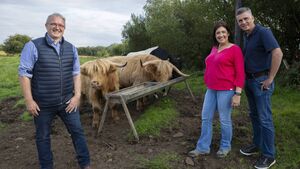Farm succession is now 'a big concern'

Michael Gill on his farm at Coolaght, with US visitors Debra and Ken Shutika from Fairfax, Virginia, USA, and his Highland and White-Belted Galloway cattle. Picture: John Corless
The question of who will take over the family farm is one of the biggest issues facing rural Ireland today, according to Michael Gill, Head of the Department of Organisational Development at the Atlantic Technological University (ATU) with programmes in Castlebar, Mountbellew and Galway.
Speaking on his farm in Coolaght, between Kiltimagh and Claremorris last week, Mr Gill told the that succession is becoming an ever more pressing concern.
“One of the biggest issues we’re grappling with at the moment is succession and succession planning for young people coming up, so that they’re there to actually take over the family farm,” he said. “Unless you have the young people coming up to take it over, they’re simply going to close down. That’s true here and it’s true right across Ireland.”
Mr Gill, who oversees ATU Mountbellew’s agricultural programmes in agri-business and and agri-science, was hosting visitors at his small family farm in Coolaght. The village, strikingly beautiful in its setting between two lakes and bounded by a river, is a patchwork of native woodland, forestry and pasture.
On the day, visitors Debra and Ken Shutika, from Virginia, USA – both lecturers at George Mason University, Fairfax – joined him to view his herd of White-Belted Galloway and Highland cattle.
“These breeds are ideal for the type of ground we have here,” Mr Gill explained. “They’re lighter animals with bigger hooves, which means they don’t churn up the land. They’re also good for rooting out invasive species and letting native grasses come through. I’ve had Highlanders for four or five years now, and they suit this land perfectly.”
He also keeps other cattle, including Frisians and Aberdeen Angus, but believes the Highlanders and Galloways are best matched to the farm’s mixed terrain.
While acknowledging that they may not achieve the same commercial weight as continental breeds such as Charolais or Limousin, Mr Gill stressed that the economics balance out.
“They’ll never be as big as the continental breeds, but they’re cheaper to keep and ultimately they’re destined for the butcher. It’s a system that works here.”
His concern, however, lies less with breeds and more with the future of farming families.
“This is a small family farm, and I’d love to see more small family farms keep going. The more families that leave farming, the harder it is to get back in. That’s why succession is such a big issue,” he said.
The American visitors shared his appreciation of the local landscape and farming traditions. Debra Shutika, who previously spent nine months in Mayo as a Fulbright Scholar at ATU, said returning to a Mayo farm was a highlight of her trip.
“I grew up on a small farm in West Virginia, so coming here feels very familiar,” she said. “When I was in Mayo before, I researched farming and traditional practices. I really love the life here – the land, the people, everything about it.”
Ms Shutika, who lectures in folklore, explained that her research had focused on how Irish farming has changed over the past fifty years. She also taught at ATU, including courses in digital storytelling, where Mayo students created short films exploring local history.
“The students from Mayo did a wonderful project on the history of ATU-Mayo, which used to be an asylum. It was brilliant work,” she said.
For Mr Gill, blending modern education with hands-on farming remains at the core of his role in ATU. At the Mountbellew campus, students train across 120 hectares of working farmland with access to livestock, milking parlours, grain stores and handling facilities.
“It’s all about giving students the practical experience they need,” he said.
But on his home ground in Coolaght, Michael Gill’s thoughts return to the future of the family farm.
“Having animals on the ground is a nice way of maintaining the land and keeping activity in the local area,” he said. “But without succession, without young people coming through, small farms like this will disappear. And once they’re gone, they’re very hard to get back.”





